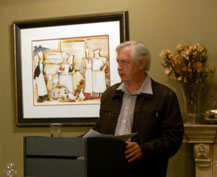Latest News Archive
Please select Category, Year, and then Month to display items
02 January 2025
|
Story Gerda-Marie van Rooyen
|
Photo Supplied
 Leading the research in South Africa is Prof Linus Franke from the Department of Soil, Crop and Climate Sciences.
Leading the research in South Africa is Prof Linus Franke from the Department of Soil, Crop and Climate Sciences.
Scientists are actively pursuing the successful breeding of diploid hybrid potatoes from inbred lines. This is expected to revolutionise potato breeding as it holds the key to rapid genetic progress. It will introduce new varieties for commercialisation through seed. Currently, existing potato variants have a gene that renders self-pollinated seeds infertile.
Prof Linus Franke, an academic in the Department of Soil, Crop and Climate Sciences at the UFS, is leading the research in South Africa. “This technology allows the production of genetically uniform potato seed that is easy to transport and largely disease-free.” He says this differs from conventional breeding whereby only vegetative propagation is possible due to tetraploid varieties in potatoes. It also risks carrying pests and diseases from one generation to the next – leading to the accumulation of pests and diseases with each round of multiplication.
Seed innovation
Prof Franke explains that Solynta BV, a seed company based in the Netherlands that produces potato varieties that can be grown from seed, has included South Africa in their research efforts because it is one of Africa’s largest producers and exporters. Through his academic relationship with Wageningen University and Research, a Dutch institution renowned for its agricultural endeavours and food production, the UFS became involved in researching hybrid potatoes grown from seed.
Diploid seeds containing two sets of chromosomes allow easier gene manipulation to increase predictability and speedier genetic progress. The breeding approach enables the incorporation of tolerance to pests, diseases, abiotic stresses (cold, heat, drought) and other desired genetic traits.
Although Prof Franke is optimistic about this research, he is not blind to disadvantages. “Potato seeds are tiny and have little energy reserves, making it harder to grow potatoes from seed than from tubers.” He says potatoes from seed will take longer to cultivate than tubers, as farmers need to grow plantlets from seeds first, adding six weeks to the growing period. “It is possible that commercial farmers can grow potatoes directly from seed. Alternatively, perhaps more likely, specialised growers will produce tubers of potatoes from seed; these tubers are then sold as seed tubers to other potato farmers, who then continue their normal practices of producing potatoes for the market from tubers.”
Financial benefits
Prof Franke says farmers have reason to get excited. “Seed potatoes will reduce input costs, as varieties with enhanced tolerance to pests and diseases require less pesticides. Planting one hectare of potatoes requires three to four tonnes of potato tubers, but only one 25 g packet of potato seeds.” Since potatoes are a more valuable commodity than maize, this technology might also increase farmers’ income potential.
Afrikaans place names were not only given by Afrikaner people, says professor.
2012-09-25
 |
Prof. Peter Raper delivering his lecture on South African place names.
25 September 2012 |
Prof. Peter Raper, honorary professor at the Department of Linguistics and Language Practice, delivered a public lecture in Clarens earlier this month. The theme of the lecture was “From Stone Age to GPS: The fourth edition of the South African Place Names Dictionary”.
Prof. Raper shared the historical development of the project as well as the challenges and other interesting observations associated with the topic. He elaborated on the dramatic change in the focus of his research on place names in South Africa.
It was previously assumed that all of the Afrikaans place names were given by the Afrikaner people and that changing these place names was consistent with the mandate of the South African Geographical Names Council (SAGNC) to transform place names. Prof. Raper said more in-depth research revealed that a significant number of place names are actually translations of original San names – into Afrikaans, Khoi and the Bantu languages. He told the audience that given the constitutional stipulation that no cultural group’s heritage may be removed, this discovery calls into the question the modus operandi of the SAGNC.
Prof. Raper’s lecture was part of the conference programme of the Third International MIDP IV Symposium that took place on the Qwaqwa campus. The MIDP (Multilingual Information Development Programme) is a project sponsored by the Province of Antwerp. The theme for this year’s symposium was “Multilingualism for Empowerment” and was presented in collaboration with the University of Antwerp.